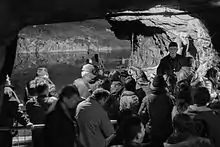Seegrotte
The Seegrotte, near Hinterbrühl, Austria, is a cave system with a large grotto located under a former gypsum mine.

Boat tour briefing
It was closed in 1912 after the mine flooded with 20 million liters of water. It became a tourist attraction after 1930 and has been one ever since, with the exception of World War II.[1] The lake is 60 meters below ground, the water surface is 6200 m² and pumps are used to keep the waterlevel down.[2]
Visitors can tour the old mine and take a boat ride across the underground lake.
World War II history
During World War II the Seegrotte was used for production of Heinkel He 162A jet fighters in Nazi Germany's "second Ruhr".[3]
References
- "Seegrotte history", Seegrotte Hinterbrühl Schaubergwerke GmbH, retrieved on January 3, 2014.
- "Lower floor description", Seegrotte Hinterbrühl Schaubergwerke GmbH, retrieved on January 3, 2014.
- "The Coming Phase". Flight Magazine. September 23, 1943. Retrieved 2010-10-20.
This vast industrial area, which has been called by the Germans the "second Ruhr" (and which includes the Southern regions of Germany, the plateau of Bohemia, and Polish Silesia, hitherto more or less impervious to bomber attack), has been stripped of its geographic defenses
Cite journal requires|journal=(help)- NOTE: After Allied Operation Pointblank bombing of German aircraft facilities had begun, Nazi Germany dispersed the 27 larger works of the German aircraft industry across 729 medium and very small plants (some in tunnels, caves, and mines):
- Galland, Adolf (1968) [1954]. The First and the Last: The Rise and Fall of the German Fighter Forces, 1938-1945. Ninth Printing - paperbound. New York: Ballantine Books. p. 237.
- NOTE: After Allied Operation Pointblank bombing of German aircraft facilities had begun, Nazi Germany dispersed the 27 larger works of the German aircraft industry across 729 medium and very small plants (some in tunnels, caves, and mines):
External links
| Wikimedia Commons has media related to Seegrotte Hinterbrühl. |
This article is issued from Wikipedia. The text is licensed under Creative Commons - Attribution - Sharealike. Additional terms may apply for the media files.